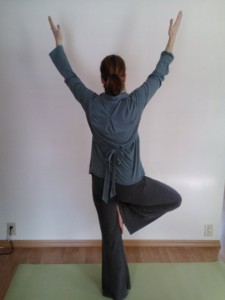
Welcome!
Namaste, as they often say at the beginning and ending of Yoga classes.
If you are going through a divorce or separation, one of the best pieces of non-legal advice I can give you is to take up Yoga (or reengage with your existing practice with renewed determination).
Now, you may be wondering: “What in the world is the connection between divorce or separation and Yoga?”
Well, Yoga can help fight stress, depression and anxiety, among other health benefits, which are common health and wellness issues to address when you experience conflict in your life.
As a Collaborative Practice Lawyer and Family Mediator, who works in the middle of family conflict on a daily basis, I have benefited from practicing Yoga as a means to reduce my stress level, to increase my resiliency to stressful situations and to improve my overall fitness level.
If it works for the professionals you are working with, it could just as easily work for you.
I recommend Yoga to anyone going through divorce or other family conflict or significant life transition. Yoga just provides a nice mix of low-impact physical movement and increased stress resilience.
There are many different types of Yoga, but in most western Yoga studios, Yoga practice is about connecting with your physical and mental self. There is a focus on being mindful of your breathing and feedback from your body as you move through the poses or as you simply sit or lay still. It often incorporates a portion of meditation practice that teaches us to observe our thoughts non-judgmentally which helps us further observe our physical reaction to our thoughts and feelings and, as a benefit, to feel less negative physical reactions to stress.
To learn more about Yoga, you may want to check out your local Yoga studio(s), which you can find by Googling Yoga and looking through the local results. Also look online at
Yoga Journal. I am a subscriber of Yoga Journal and have copies on-hand at my office for clients. For my own personal practice, I’ve been very tempted to try out streaming online classes from
myonlineyoga.com, which has a huge selection of classes and has a very low monthly cost.
It goes without saying that it is incredibly helpful to be able to maintain a sense of calm during tense discussions (yes, even in
Collaborative Practice!) about important things such as parenting schedules for the kids and different options for dividing assets and debts. What if you could do a better job of keeping your cool and keeping your focus on your long-term goals and concerns, instead of how mad you are about what your spouse just said?
Give Yoga a try. Namaste.
 Dogs have long been known for their ability to have healing effects on the sick, but did you know that adopting a dog while going through the divorce process can provide another wonderful form of therapy? Whether getting a new puppy or adopting a dog, there is value in adding a furry companion to your life. Man’s (or woman’s) best friend alleviates that empty feeling you may now be experiencing when you walk in the door at night.
Divorce often time leaves you feeling unwanted, just like many of those dogs at the shelter, which makes that canine even more relatable. Perhaps that dog came to the shelter from a divorced family herself. It has been proven that people benefit from interacting with canines. Simply petting a dog can decrease levels of stress hormones, regulate breathing, and lower blood pressure. Research also has shown that petting releases oxytocin, a hormone associated with bonding and affection, in both the dog and the human. Dogs respond to human emotions, and seem to know just when their companion needs a little extra loving.
A dog, or other animal, can also be helpful for children coping with a divorce. Research shows that a dog can be therapeutic for a child experiencing a divorce crisis. A pet teaches a lot about coping skills, at a time when their parents may not coping very well. Cuddling up to a dog or other critter can be calming, and teaching a dog a new trick can be rewarding.
If you are looking for a constant companion, who will help reduce your stress levels (and won’t talk back!), adding a new furry friend to your home may be a good divorce healing solution for you.
Dogs have long been known for their ability to have healing effects on the sick, but did you know that adopting a dog while going through the divorce process can provide another wonderful form of therapy? Whether getting a new puppy or adopting a dog, there is value in adding a furry companion to your life. Man’s (or woman’s) best friend alleviates that empty feeling you may now be experiencing when you walk in the door at night.
Divorce often time leaves you feeling unwanted, just like many of those dogs at the shelter, which makes that canine even more relatable. Perhaps that dog came to the shelter from a divorced family herself. It has been proven that people benefit from interacting with canines. Simply petting a dog can decrease levels of stress hormones, regulate breathing, and lower blood pressure. Research also has shown that petting releases oxytocin, a hormone associated with bonding and affection, in both the dog and the human. Dogs respond to human emotions, and seem to know just when their companion needs a little extra loving.
A dog, or other animal, can also be helpful for children coping with a divorce. Research shows that a dog can be therapeutic for a child experiencing a divorce crisis. A pet teaches a lot about coping skills, at a time when their parents may not coping very well. Cuddling up to a dog or other critter can be calming, and teaching a dog a new trick can be rewarding.
If you are looking for a constant companion, who will help reduce your stress levels (and won’t talk back!), adding a new furry friend to your home may be a good divorce healing solution for you.  Dogs have long been known for their ability to have healing effects on the sick, but did you know that adopting a dog while going through the divorce process can provide another wonderful form of therapy? Whether getting a new puppy or adopting a dog, there is value in adding a furry companion to your life. Man’s (or woman’s) best friend alleviates that empty feeling you may now be experiencing when you walk in the door at night.
Divorce often time leaves you feeling unwanted, just like many of those dogs at the shelter, which makes that canine even more relatable. Perhaps that dog came to the shelter from a divorced family herself. It has been proven that people benefit from interacting with canines. Simply petting a dog can decrease levels of stress hormones, regulate breathing, and lower blood pressure. Research also has shown that petting releases oxytocin, a hormone associated with bonding and affection, in both the dog and the human. Dogs respond to human emotions, and seem to know just when their companion needs a little extra loving.
A dog, or other animal, can also be helpful for children coping with a divorce. Research shows that a dog can be therapeutic for a child experiencing a divorce crisis. A pet teaches a lot about coping skills, at a time when their parents may not coping very well. Cuddling up to a dog or other critter can be calming, and teaching a dog a new trick can be rewarding.
If you are looking for a constant companion, who will help reduce your stress levels (and won’t talk back!), adding a new furry friend to your home may be a good divorce healing solution for you.
Dogs have long been known for their ability to have healing effects on the sick, but did you know that adopting a dog while going through the divorce process can provide another wonderful form of therapy? Whether getting a new puppy or adopting a dog, there is value in adding a furry companion to your life. Man’s (or woman’s) best friend alleviates that empty feeling you may now be experiencing when you walk in the door at night.
Divorce often time leaves you feeling unwanted, just like many of those dogs at the shelter, which makes that canine even more relatable. Perhaps that dog came to the shelter from a divorced family herself. It has been proven that people benefit from interacting with canines. Simply petting a dog can decrease levels of stress hormones, regulate breathing, and lower blood pressure. Research also has shown that petting releases oxytocin, a hormone associated with bonding and affection, in both the dog and the human. Dogs respond to human emotions, and seem to know just when their companion needs a little extra loving.
A dog, or other animal, can also be helpful for children coping with a divorce. Research shows that a dog can be therapeutic for a child experiencing a divorce crisis. A pet teaches a lot about coping skills, at a time when their parents may not coping very well. Cuddling up to a dog or other critter can be calming, and teaching a dog a new trick can be rewarding.
If you are looking for a constant companion, who will help reduce your stress levels (and won’t talk back!), adding a new furry friend to your home may be a good divorce healing solution for you. 




